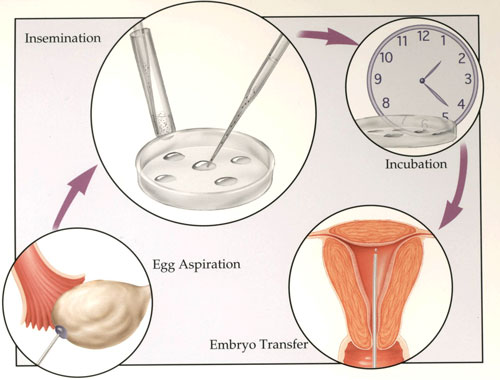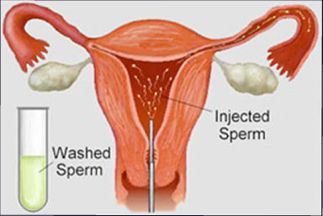
The science of Infertility Treatment is constantly evolving and new technology and expertise is being constantly developed at our advanced IVF Centre in India with the result that the Pregnancy and live birth rates have significantly improved over the past few years.
At India's leading IVF Clinics we have a scientific approach to diagnose the cause for infertility. Our IVF center has state-of-the-art facilities for (IVF), In Vitro Fertilization and fully functional laboratory for diagnostic and therapeutic tests. The world class facilities along with competent staff have enabled us to achieve an outstanding success rate. We provide everything under one roof and make best possible efforts to help infertile couples achieve their dreams of parenthood.
Hundreds of International Patients who travelled long distance to India have benefitted from the expertise of renowned Indian doctors.
Why come to India for IVF / Infertility Treatment
• One of the world's leading destinations for IVF procedures
• Success rate in excess of 50% for women in some age groups
• International protocols. Safe procedures
• Latest World class technology
• IVF specialists of great skill and experience
• Significant Cost Savings with very affordable treatment packages
• Specialized Modern hospitals with highly competent and experienced IVF doctors

IVF India has complete range of services to handle any kind of infertility with the best of professionals to back the best in class technology at work.
• In Vitro Fertilization (IVF)
• Intra Uterine Insemination (IUI)
• Intra Cytoplasmic Sperm Injection (ICSI)
• Blastocyst Culture
• Sperm Aspiration) PESA (Percutaneous Epididymal Sperm Aspiration)
• Advanced Treatment Options like TESE (Testicular Sperm Extraction) MESA (Microsurgical Epididymal )
• Cryopreservation
• Laser Assisted Hatching
• Embryo Transfer
0. Ovulation Induction
1. Egg Donation/Egg Sharing
2. Zona free Embryo Transfer
3. Semen Bank

Infertility in women is conventionally defined as failure to conceive despite regular sexual intercourse for a year, without using any contraceptive. There are many reasons for female infertility. Some of the most common reasons are as follows.
• Irregular or absent periods
• Hormone imbalance
• Smoking or alcohol use
• Endometriosis
• Fibroids
• History of infertility
In-Vitro Fertilization (IVF) :
In Vitro Fertilisation refers to the medical technique through which the female's egg cells are fertilised by male sperm outside of the body. Hormones are used to control the female's ovulatory process in order to ensure the generation of a sufficient number of eggs. The procedure is completed with the removal of the eggs from the ovary of the female and allowing the union of the egg and the sperm in a controlled fluid. Once the egg is fertilised, it is transferred to the female uterus. IVF treatment is preceded by a range of screening tests for both the male and the female. Screening tests can be done in the patients' home country. The female should arrive in India a day or two prior to commencement of her monthly cycle and will be required to stay in India for two to three weeks. The male partner is required only for retrieval of the sperm, if he is otherwise normal from the fertility point of view.
Step 1: Suppressing the natural monthly cycle
The lady is given a drug to suppress the natural monthly cycle either as an injection or a tablet for about two weeks.
Step 2: Boosting the egg supply
Once the natural cycle is suppressed, fertility hormone called FSH (follicle stimulating hormone) is given to the lady as an injection for about 12-15 days. The hormone increases the number of eggs that the ovaries produce, thus increasing the number of eggs that that can be collected and fertilised. With more fertilised eggs, the doctor has a greater choice of embryos that can be used during the treatment.
Step 3: Monitoring the progress
Your treating doctor would monitor the progress after the drugs are given. Blood test and vaginal ultrasound scan is done to check the ovaries and about 36 hours before the eggs are to be collected, the last hormone injection is given to help the egg get mature.
IStep 4: Egg collection
You would be sedated and your eggs would be collected under ultrasound guidance. A needle is inserted and through vagina to each ovary and the eggs are collected.
Step 5: Egg fertilisation and embryo transfer
The collected eggs are mixed with your partner's or the donor's sperm in the laboratory and checked after 20 hours to see if they have fertilised. If the sperms are few or weak, each egg may need to be injected individually with a single sperm. This is called intra-cytoplasmic sperm injection or ICSI.
The fertilised eggs are allowed to grow in the laboratory for 1-5 days and best embryo is then transferred to the lady's womb.
The woman is given medicines, either progesterone or hCG (chorionic gonadotrophin), to help prepare the lining of the womb to receive the embryo. The number of embryos to be transferred should be discussed between the doctor and the patient before starting the treatment, because multiple embryo placements carry the risk of multiple pregnancy and multiple births. Suitable embryos can otherwise be frozen for future attempts.
More than 90% of male infertility cases are due to low sperm counts, poor sperm quality, or both. In 30% to 40% of cases of sperm abnormalities, the cause is unknown. It may be the end result of one or a combination of factors that include chronic illness, malnutrition, genetic defects, structural abnormalities, and environmental factors. Some of the common factors causing male infertility are:
• Prostate infections
• Varicocele
• A history of sexually transmitted disease
• Low sperm or no sperm count
• Poor sperm motility
• Abnormally-shaped sperm
Research studies indicate close to 10% of infertile men have immune reactions to sperm, which cause them to produce antibodies that kill sperm cells. Varicocele (enlarged veins in the testes) is another cause in men where the veins draining the testes get enlarged causing decreased oxygenation to the testes affecting sperm quality. Male tube blockage can also be due to obstructions in the tubes that transport fertile sperm. Sexually transmitted diseases are also linked to tube blockage problems. The fertilizing potential of sperm depends on the shape of spermatozoa, their motility and their ability to perform the functions necessary for fertilizing an egg and finally, the transfer of an intact genetic material (DNA) to the egg at the time of fertilization.
Male Infertility Treatments
- Intracytoplasmic Sperm Injection (ICSI)
- PESA (Percutaneous Epididymal Sperm Aspiration)
- MESA (Microsurgical Epididymal Sperm Aspiration)
- TESE (Testicular Sperm Extraction) Surgical Sperm Retrieval
Intrauterine insemination (IUI) is a procedure that allows the physician to deposit specially washed and prepared sperm directly into the uterus via a small flexible catheter. IUI allows the sperm to bypass the cervix; therefore more are available to fertilize the egg(s). Unwashed sperm should never be placed into the uterus as serious, even fatal, allergic reactions can occur.
It is most commonly used for infertility associated with endometriosis, unexplained infertility, anovulatory infertility, very mild degrees of male factor infertility, cervical infertility and for some couples with immunological abnormalities. It is a reasonable initial treatment that should be utilized for a maximum of about 3-6 months in women who are ovulating (releasing eggs) on their own. It can be reasonable to use it for somewhat longer than this in women with an ovulation that has been stimulated to ovulate.
IUI is responsible for most high order multiple births discussed by the mass media. This is because the exact number of eggs ovulated cannot be precisely controlled. In IVF, a known number of embryos are placed in the uterus, thus limiting high order multiple births (>=3). FSH stimulated cycles should only be managed by a physician thoroughly trained in the use of fertility medications.

Mr.Gilbert, Knee Replacement, Nigeria
Mr.Gilbert from Aba, Nigeria who came to India for his knee replacement in India.
Mrs. Kalangwa George, Lung Cancer, Kenya
Mrs. Kalangwa George from Mombasa, Kenya who came to India for her Lung Cancer Treatment in India.
Mrs. Elisabeth, Breast Cancer Surgery, Nigeria
Mrs. Elisabeth from Kano, Nigeria who came to India for the Breast Cancer Surgery.
Mr.Tselmeg, Kazakhstan, Spine Surgery
Mr.Tselmeg from Astana, Kazakhstan who came to India for the Spine Surgery
Mr. Stephen Okafor, Spine Surgery, Nigeria
Mr. Stephen Okafor from Onitsha, Nigeria who came to India for the Spine Surgery
Mrs. Asiata Nofiu, Laparoscopic Ovarian Cystectomy , Nigeria
Mrs. Asiata Nofiu from Lagos, Nigeria who came to India for the Laparoscopic Ovarian Cystectomy
Mr. Alhassan Osman, Prostate Treatment, Tanzania
Mr. Alhassan Osman from Mwanza, Tanzania who came to India for the Prostate Treatment
Mr. Okubowa Babatunde , Heart Surgery , Zimbabwe
Mr. Okubowa Babatunde from Harare, Zimbabwe who came to India for the heart hole surgery